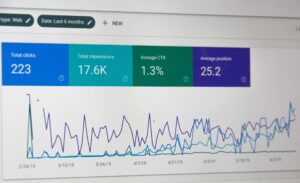In today’s fast-paced digital world, the landscape of content creation is rapidly evolving, driven significantly by advances in artificial intelligence (AI). Language Learning Models (LLMs) stand at the forefront of this revolution, transforming how content is developed, optimized, and engaged with across various platforms. This blog explores the extensive benefits of utilizing AI in crafting diverse content types, detailing its profound impact on search engine optimization (SEO) and user engagement.
Unleashing Creativity with AI in Content Creation
The advent of AI-powered content creation tools has ushered in a new era of marketing efficiency and creativity. These tools are not just about automating content; they are about enhancing the creative process, enabling marketers to push boundaries and innovate in ways previously unimaginable.
- Scalability: AI dramatically scales content production, allowing brands to publish more content across more channels at a faster pace than ever before.
- Multilingual Content Creation: AI breaks language barriers, enabling the creation of multilingual content without the need for extensive translation services, broadening audience reach on a global scale.
- Content Diversity: From video scripts and blog posts to interactive web experiences, AI can craft a range of content types, each optimized for its intended platform and audience.
Elevating AI’s Analytical Power
AI enhances SEO strategies by providing deep analytical capabilities that offer unprecedented insights into content performance and user preferences. This section delves deeper into how AI tools optimize content for search engines, improving visibility and driving organic traffic.

- SEO Automation: AI tools automate various aspects of SEO, from keyword research to meta tag generation, streamlining the optimization process and ensuring best practices are consistently applied.
- Custom Content Recommendations: By analyzing user data, AI can recommend specific topics that are likely to perform well, helping content creators to focus on creating articles that resonate with their audience and rank well on search engines.
- Paid ads budget, visual, text analysis & creation. Feed your paid campaign data to AI to get insights on improvement, new visuals or texts that sell.
- Lead classification & pre-sale (warm-up). AI can score leads based on the given metric to provide Sales rep with more qualitative data. Also, AI can teach itself to focus more on higher scoring leads.
- Behavioral Analysis: AI analyzes past behavior to predict what content will be most appealing to different segments of an audience, increasing the relevance and effectiveness of marketing campaigns.
- A/B Testing at Scale: AI can automate A/B testing for different content types, learning which versions perform best and adapting content strategies in real time based on data-driven insights.
- Other: copywriting, language check, translation, localization and more.
Overcoming Challenges with AI in Content Creation
While AI presents numerous opportunities for content creation, it also poses challenges that need careful consideration to ensure effective and ethical use.
- Balancing Human Creativity and AI: While AI can generate content, human oversight is crucial to maintain the brand voice and ensure content quality.
- Transparency and Ethics: As AI becomes more involved in content creation, maintaining transparency about AI’s role and addressing ethical concerns related to data use and privacy become paramount.
- Output quality is highly dependent on prompt engineering skills. Even the best prompts need validation, thus, make sure you follow the guidelines but always test and adjust your inputs.
Future Trends: The AI-Driven Content Ecosystem
Looking ahead, the integration of AI in content creation is set to deepen, with emerging technologies further enhancing how content is personalized and optimized. Future trends might include:

- Advanced Natural Language Generation (NLG): AI will be able to create more complex and nuanced content, potentially offering personalized narratives on a mass scale.
- Greater Integration with IoT: As IoT devices proliferate, AI could help create more dynamic content that interacts with users based on real-time data from their environment.
- AI-Agents will be created for smaller tasks: AI SEO-expert, AI-FB-Ads-Manager, AI-Copywriter, AI-Designer, etc. Narrowing down to a specific topic allows to have a more clear focus on what the model is required to achieve, hence, better outputs. Most likely, AI-agents will be managed by a master-AI, Head of Marketing.
Conclusion
The integration of LLMs and other AI technologies in content creation is transforming the marketing landscape, offering new ways to engage audiences, optimize content for search engines, and enhance overall content quality. As this technology evolves, it promises to unlock even more innovative content strategies, helping brands to stay relevant and competitive in the digital age.
Discover how AI can elevate your content strategy and engage your audience more effectively!

